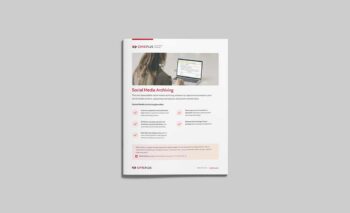The Public Servant’s Guide to Social Media Community Guidelines
Social media is an essential tool for building meaningful connections with your community. Your accounts not only offer the means for communicating important messages but also enable you to showcase the hard work of government employees and seek out valuable input from residents.
Many municipalities have already adopted policies that guide employees on appropriate usage of social media. It can be equally useful to align on community guidelines to promote civility, define acceptable behavior, and outline processes for content moderation.
This guide is designed to help public servants understand what community guidelines are, why they matter, and how to create and enforce them responsibly.
What Are Social Media Community Guidelines?
Community guidelines are public-facing rules that define acceptable behavior on your agency’s social media pages. They act as a code of conduct for online interactions, offering clarity to the public and guidance for your organization.
Typical social media community guidelines include:
- Details on the purpose of the social media account and its role in the agency’s overall communications strategy
- Guidance on the types of content that are allowed and not allowed
- Rules for commenting and posting
- Information on how violations are handled
- Legal disclaimers and details on First Amendment protections
Why Public Agencies Should Consider Community Guidelines
1. Set Expectations for Public Behavior
Having publicly accessible guidelines clarifies what kind of conduct is prohibited on your social accounts and empowers moderators to act where appropriate.
2. Create a Safe Environment for Staff and Residents
Guidelines help create boundaries to protect staff members and residents from abusive interactions.
3. Preserve Focus on Civic Service and Engagement
Your staff’s mission is to serve the public good. Guidelines for social media use help keep discourse productive and on topic.
4. Mitigate Legal and Reputational Risk
By moderating discussions within a carefully defined framework, your agency reduces the risk of being accused of biased or unlawful action against residents’ free speech.
What to Consider Before Implementing Guidelines
1. Legal Considerations
Posts and comments on government-run social media pages are generally protected under the First Amendment. Removing comments or blocking users without clear, legally defensible justification can lead to lawsuits. Work with your legal counsel to create a policy that aligns with applicable federal- and state-level free speech laws.
2. Public Perception
Some community members may view your guidelines as censorship if enforcement isn’t transparent. Make it clear that your intent is to maintain a safe, inclusive space.
3. Resource Requirements
Strategically monitoring and moderating social media accounts takes time and effort. Before introducing public-facing guidelines, make sure you have the capacity to enforce them consistently.
The First Amendment and Your Community Guidelines
As with anything related to social media, it’s important to ensure that your community guidelines safeguard your residents’ First Amendment rights.
How to Create Effective Community Guidelines
1. Define Your Purpose
Begin with a simple mission statement. What is the purpose of your agency’s social media accounts? This will provide context for the rules and moderation guidelines that follow.
2. Outline What Is and Isn’t Allowed
Describe acceptable behavior and list prohibited content such as threats or commercial promotion. Remember that the most objectionable types of content are often the most likely to be protected under the First Amendment.
3. Explain Enforcement
Clarify how violations will be handled. Under what circumstances will users be muted, blocked, or banned?
4. Consult Your Legal Counsel and Include the Appropriate Disclaimers
Always discuss new policies with your legal counsel to ensure they are aligned with free speech laws and that your staff is empowered to enforce guidelines.
5. Make the Guidelines Public and Accessible
Make sure your policies are written in plain language and are always easy for residents to find.
Enforcing Guidelines: Best Practices
- Be consistent: Enforce rules without bias, applying the same guidelines no matter who is posting or what opinions they’re sharing.
- Document everything: In case of legal challenges, keep a record of moderated posts and the rationale for muting or deleting them.
- Train your team: Ensure relevant staff members understand your guidelines and how to apply them.
-
-
Social Media Community Guidelines Example
Social Media Community Policy
[Municipality Name] uses social media to engage and educate the community. Our social media accounts allow us to share information with the community, seek feedback from residents, and showcase the hard work of your government officials.
Social Media Policy Purpose
The purpose of this policy is to ensure that [Municipality Name]’s social media communities serve their function of connecting residents and keeping them informed in a safe environment.
Prohibited Content
- Content that violates any laws or encourages the violation of any laws
- Content that may compromise the safety of residents
- Content intended to defame an individual, group, or organization
- Content that includes threats against any individual, group, or organization
- Sexually explicit content
- Content that violates copyright laws
-
-
Accessibility and Inclusion
[Municipality Name] is committed to ensuring our online communities remain accessible for all residents:
- We are always working to meet current accessibility standards for an inclusive experience.
- Closed captioning is provided for all video content.
- Descriptive alt text is included with all images.
- Residents are welcome to share their feedback on creating a more inclusive and accessible community.
-
-
If you encounter inaccessible content, you can report it to [Municipality Name] by contacting [Email/Phone Number].
Policy Enforcement
[Municipality Name]’s social media administrators reserve the right to take the following actions if a user consistently violates the community guidelines.
1. Warning
Administrators will issue a warning after the first offense to reiterate community guidelines.
2. Reporting
After repeated offenses, administrators will report users to the platform. If users are found to have violated terms of service, they may be temporarily or permanently banned. Where warranted, administrators will report users to law enforcement.
Transform Social Media Management
CivicPlus® Social Media Archiving captures and preserves your social media content in near-real time to support compliance with public record laws in all 50 states. Want to learn more? Reach out to schedule a demo.


